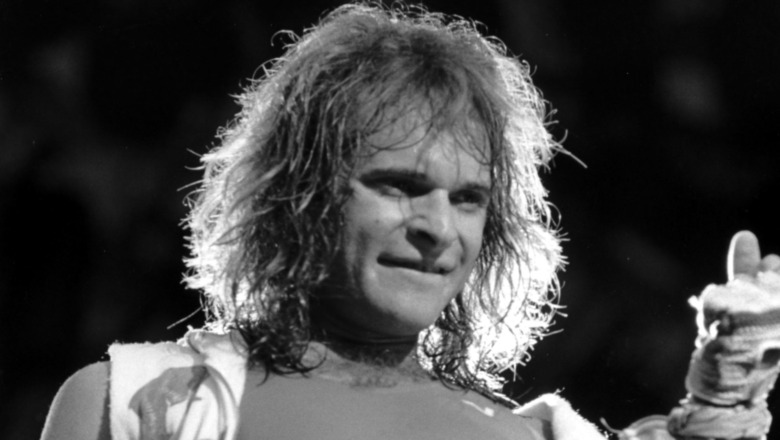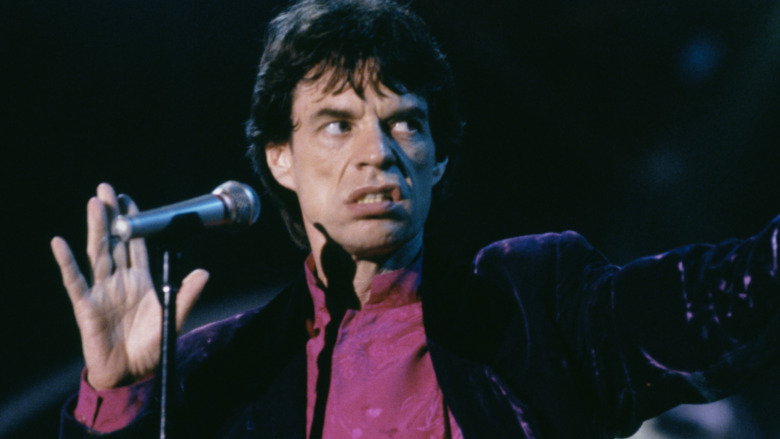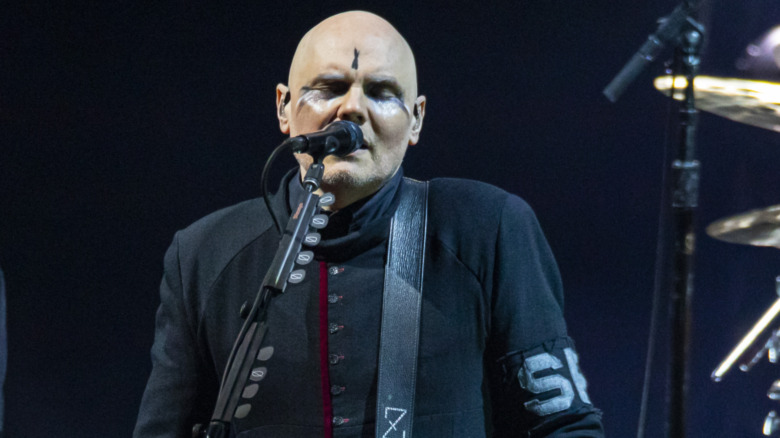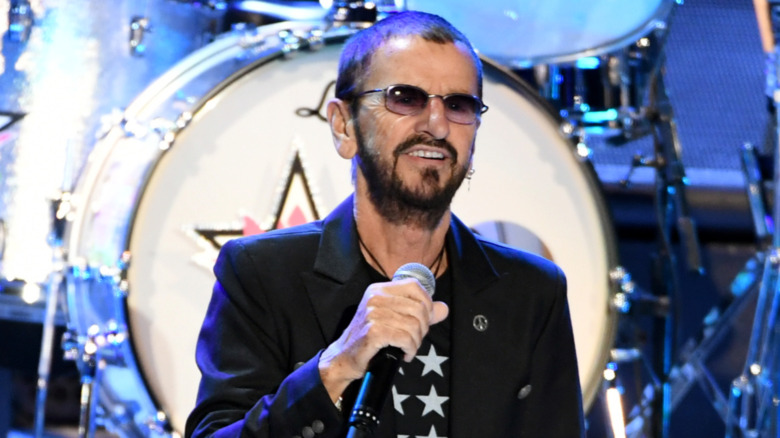Nearly 30% Of People Agree This Iconic Rock Star Had The Worst Solo Career
There are many reasons why rock stars choose to embark on solo careers despite the massive success of their bands. Sometimes they've just got tons of ideas that don't fit the vision of their current group. On other occasions, their band may be on hiatus from touring, recording, or both. Then you've got those musicians who were fired from their band or quit, or those who came from a group that had recently disbanded. Going solo could be the start of a prosperous new career path. But on the other hand, one's solo career could also turn out to be an abject failure, with fans around the world asking what in the world possessed that musician to quit their day job.
Given how many members of prominent bands failed to match those acts' success when they ventured out on their own, we at Grunge asked you, our readers, to chime in and tell us which rock star you felt had the worst solo career. We polled a total of 669 people and asked them for their thoughts, and when the results were tallied, there was one individual who got nearly 30% of the total vote — a far greater share than the rocker who came in at second place. But before we get to that musician, let's count down all of your choices and take a look at the other rock stars who might have been better off sticking it out with their band.
Were these '80s icons really worse off for leaving their bands?
Coming in at sixth place with 9.87% was a rather surprising entry, considering how his still-ongoing solo career far outlasted his band's lifespan. In 1984, Sting decided to leave The Police and go solo, effectively signaling the end of the band just one year after "Every Breath You Take" topped the Billboard charts and cemented their legacy as one of the decade's best-selling acts. Now there's nothing shabby at all about Sting's career on his own, which has seen him reach the top 20 several times with songs such as "If You Love Somebody Set Them Free" and "Fields of Gold," but it can also be argued that none of those solo recordings hold a candle to the ostensibly romantic, yet ultimately creepy "Every Breath You Take."
At No. 5 was another iconic '80s vocalist who went solo shortly after his band recorded their biggest hit. David Lee Roth got 13.90% of the vote, and his solo career yielded some big hits right off the bat, including his covers of the Beach Boys' "California Girls" and Louis Prima's "Just A Gigolo/I Ain't Got Nobody." But let's face it — even with all the drama with his on-and-off bandmates, Diamond Dave was arguably better off as one-fourth of Van Halen, which was one of those rare bands that remained fairly relevant despite the changing musical trends that turned most other '80s hard rock bands into afterthoughts in the '90s.
Scott Weiland and Mick Jagger failed to match their bands' popularity as solo acts
Our next two rockers come from different generations but have one thing in common, apart from the word "stone" in their bands' names — their solo careers were far less impressive than those of the bands they played (or still play) for.
The late Scott Weiland was, just like his former band Stone Temple Pilots, a musical chameleon of sorts. This was evidenced on his 1998 album "12 Bar Blues," which AllMusic described as an "unpredictable, carnivalesque record" that explored multiple genres. However, it's fair to say that Weiland's solo recordings aren't as beloved or as enduringly popular as STP's 1990s classics such as "Plush" and "Interstate Love Song," or his work with 2000s supergroup Velvet Revolver, hence his fourth-place ranking with 14.35%.
The Rolling Stones' Mick Jagger wasn't too far ahead of Weiland at 14.95%, and when people talk about his solo career, most would likely mention his duet with David Bowie on their infamous cover of Martha Reeves and the Vandellas' "Dancing in the Streets" — which happened to rank second in our survey of worst songs of the '80s. But that's just the tip of the iceberg, as Jagger's 2003 album, "Goddess in the Doorway," was such a failure that it sold a measly 954 copies on the day of its release, per the New York Post. Worse, Jagger's longtime friend and bandmate, Keith Richards, gave it a savage review in his 2010 autobiography "Life," referring to it as "Dogs*** in the Doorway." Ouch.
Billy Corgan draws more attention as a wrestling promoter than as a solo artist
Like the aforementioned Stone Temple Pilots, the Smashing Pumpkins were 1990s alt-rock giants, but with the band temporarily breaking up in 2000 (via Ultimate Classic Rock), it was inevitable for Billy Corgan to try his luck on his own, as he did when he released his solo debut, "The Future Embrace," in 2005. It got middling reviews from sites such as Pitchfork, and it even featured a cover of the Bee Gees' "To Love Somebody," with The Cure's Robert Smith on guest vocals — anybody noticing a trend here?
Although the Smashing Pumpkins have long since reunited, their oftentimes volatile frontman has continued releasing solo albums, with his last two, including 2019's "Cotillons," released under his complete name, William Patrick Corgan. However, it does say something when you're far better known outside your main band for your work as a professional wrestling promoter (via the Associated Press), as opposed to occasionally releasing solo albums during said band's downtime. As such, it's hardly surprising that Corgan came in second with 18.24% of the vote — a pretty sizable share, but nothing compared to that of the rock star who came in first.
Ringo Starr's post-Beatles career wasn't quite as fab
We're now down to that prominent musician who you felt had the worst solo career outside of their band, and it's none other than Ringo Starr, who topped our survey convincingly with a 28.70% share. Granted, his 1971 hit "It Don't Come Easy" deserves its place in any classic rock playlist, but if you consider how the rest of the Beatles — John Lennon, Paul McCartney, and George Harrison — had much more noteworthy solo careers than Ringo, we see why he was an easy choice for a lot of you as a rocker with a less-than-stellar solo career. Besides, most casual listeners will likely be hard-pressed to name another one of Starr's solo hits that made a similarly lasting impression, even to this day.
It's not just regular fans that seem to agree with the notion that Starr's post-Beatles career was nothing to write home about. In Ultimate Classic Rock's ranking of all 64 Beatles solo albums, seven out of the bottom 10 releases were from the drummer, with his fittingly named fourth album, 1977's "Ringo the 4th," taking the bottom spot. According to the site, the album "positions Starr in a shamelessly overproduced, 'dance'-oriented atmosphere that perhaps ranks as the most embarrassing, gut-churning moment for any former Beatle."
Even with that in mind, Ringo still deserves our respect as one of the greatest drummers of his era — and an underrated songwriter when given the chance.




